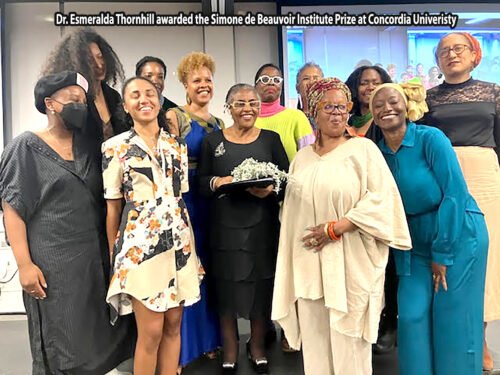
 Dr. Esmeralda Thornhill, a luminary in the academic field of Black Women’s Studies, was recently honored by Concordia University’s Simone de Beauvoir Institute for her ground-breaking work in establishing the first university-accredited course on Black Women’s Studies in Canada. The course, titled “Black Women: The Missing Pages from Canadian Women’s Studies,” was introduced in 1983 and has since become a cornerstone of Black feminist scholarship in Canada.
Dr. Esmeralda Thornhill, a luminary in the academic field of Black Women’s Studies, was recently honored by Concordia University’s Simone de Beauvoir Institute for her ground-breaking work in establishing the first university-accredited course on Black Women’s Studies in Canada. The course, titled “Black Women: The Missing Pages from Canadian Women’s Studies,” was introduced in 1983 and has since become a cornerstone of Black feminist scholarship in Canada.
Her scholarly work and advocacy has been a foundational force in shaping the discourse around Black Women’s historical and cultural narratives within Canada.
Thornhill’s approach to education is rooted in the collective spirit, emphasizing that her course was not inspired by a solitary vision but was born out of a convergence of necessities “It’s not that I was inspired to do a course on Black Women; it’s that this course was the “transformative change” response needed at that time,” Thornhill asserts. This communal ethos guided the strategic sponsoring of the course under the aegis of the Congress of Black Women of Canada (Montreal) thereby ensuring that the contributions of Black Women were recognized and understood within the broader tapestry of Canadian society.
The course, Black Women: The Missing Pages, was a revolutionary initiative that centered on the obfuscated historical presence of Black women and depicted the fabric of their lives from their own vantage point and in their own authentic voices. Dr. Thornhill emphasizes the importance of this narrative, “For Black Women, Missing Pages held and continues to hold White women accountable for using their White privilege to imperialistically appropriate feminist space exclusively as theirs.”
Thornhill’s work challenged the prevailing norms and held White feminists accountable for their own role in perpetuating white privilege and monopolizing feminist spaces.
For Thornhill and many like her, the course was more than academic enrichment; it was a defiant step towards claiming rightful space within academia. Missing Pages…symbolizes the legitimate claiming of meaningful partnership space in the Academy,” Thornhill asserts. This space was not just physical but also ideological and political, allowing, Black Women to exercise their agency also to shape the national narrative and to inform feminist discourse in Canada.
Thornhill’s teachings and the legacy of the trailblazing Black Women’s Studies course continue to resonate, offering lessons on how to navigate institutional spaces dominated by white narratives. She underscores the urgency for institutions like Concordia to actively engage in fostering equality, implying that acknowledgment of Black lives and Black Women’s lives is integral to this pursuit.
The honor bestowed upon Dr. Thornhill is not merely a recognition of past achievements but a clarion call for ongoing commitment to equality and representation. It is a testament to the enduring relevance of “Black Women, The Missing Pages,” which breaks silence and validates the diverse experiences of Black Women as essential to Canada’s identity. Through her work, Thornhill has carved a path for future generations, illustrating that the journey towards racial equality, though fraught with historical burdens, is a necessary and relentless pursuit.
In her acceptance speech, Thornhill encouraged and urged institutions to continue striving for racial equality, even as she admonished that, “institutions such as Concordia cannot afford to continue slouching towards meaningful equality with dragging feet,”
Her final thoughts serve as a powerful reminder and a challenge: institutions must move beyond passive acknowledgment and take active strides toward genuine racial equality. Her pioneering work, now honored by Concordia University, stands as a beacon of progress and a potent symbol of the ongoing fight for the rightful place of Black Women and Black People in history, in our national consciousness, and in the hearts and minds of all Canadians.













